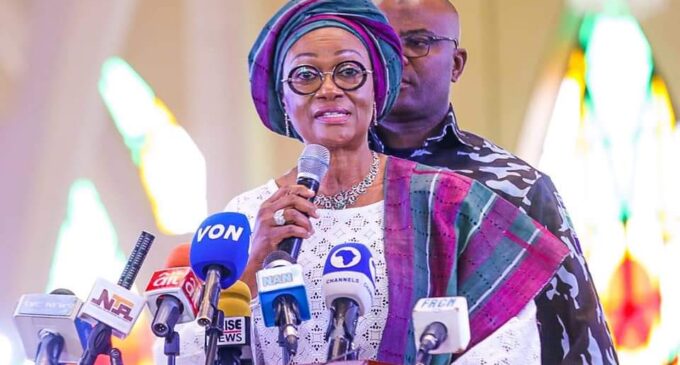328
By Tracy Moses
The First Lady, Senator Oluremi Tinubu, has described the living conditions of displaced persons in Benue State as inhumane and unbearable, stating that no citizen should be subjected to such “hellish” conditions.
Speaking during a condolence visit to Governor Rev. Fr. Hyacinth Alia and the people of the state on Tuesday, Senator Tinubu expressed deep concern over the continued killings and urged that the violence be brought to an immediate halt.
She noted that despite Nigeria’s complex blend of ethnic, religious, and cultural identities, these differences should serve as unifying elements rather than dividing lines. The First Lady called for peace and reconciliation as a path forward.
“Many of our fellow citizens are living under unbearable conditions, conditions that can only be likened to hell. Yet, they are people like us, deserving of dignity and care,” she said.
She emphasized that dialogue and patience must replace violence, and warned that Nigeria, not being at war, should not be witnessing such rampant bloodshed. Offering spiritual comfort, she prayed for divine intervention, saying, “May the Blood of Jesus cleanse our land and avenge the innocent.”
Senator Tinubu highlighted the contributions of Benue to national growth and expressed sadness that the state continues to suffer violent attacks. She also revealed that her Renewed Hope Initiative (RHI) has delivered relief materials to alleviate the hardship experienced by internally displaced persons (IDPs).
“Nigeria must choose between division and unity, destruction and healing. Our strength lies in our compassion, shared humanity, and the willingness to build bridges where walls exist,” she added.
She donated N1 billion to support victims of the attacks and called on traditional rulers to extend her condolences to affected families. She reaffirmed her commitment to aiding vulnerable groups, including children, the disabled, and the elderly.
In response, the paramount ruler of the Tiv nation, His Royal Majesty, Prof. James Ayatse, appealed to the Federal Government to act decisively against armed herdsmen and other militias tormenting communities in Benue and neighboring Nasarawa states.
He recounted the mass killing of over 200 persons on June 13 and 14, 2025, stressing that many of the attackers operate from Nasarawa and retreat there after their assaults.
“Although the deployment of troops following the President’s order has led to some improvement, the killings persist. Our communities remain unsafe, and many farmers have abandoned their lands. Hunger is rising in what was once Nigeria’s food basket,” he lamented.
The royal father criticized what he called “insufficient support” from the Federal Government, describing it as “salt in our wounds,” and said no amount of token relief could truly compensate grieving families.
He expressed appreciation for the First Lady’s empathy and presence, saying it underscores her deep understanding of the suffering faced by rural communities.
Governor Alia, in his remarks, reiterated his calls for the creation of state police and the adoption of a national policy on ranching to tackle the root causes of herder-related violence.
He commended the First Lady’s compassion, generosity, and proactive efforts through the RHI, noting that her initiatives have touched every state, including the Federal Capital Territory.
According to the governor, Benue currently harbors over 1.5 million IDPs, with newly established camps in Makurdi and Naka hosting thousands of displaced persons. He painted a grim picture of families who have lost everything and are now living in dire conditions.
He said, “The humanitarian crisis in Naka has surpassed what we witnessed in Yelewata. I appeal to the Minister of Humanitarian Affairs and other well-meaning Nigerians and international organizations to extend support to these victims. The state cannot shoulder this burden alone.”
Reaffirming his stance on decentralizing Nigeria’s policing system, Governor Alia argued that local law enforcement would be more effective in detecting and responding to security threats.
“The current centralized structure has proven inadequate. A community-based policing system would significantly enhance security and accountability,” he stated.
Governor Alia expressed gratitude to Senator Tinubu for her visit, describing it as a symbol of national unity and solidarity during a time of deep pain for the state.



